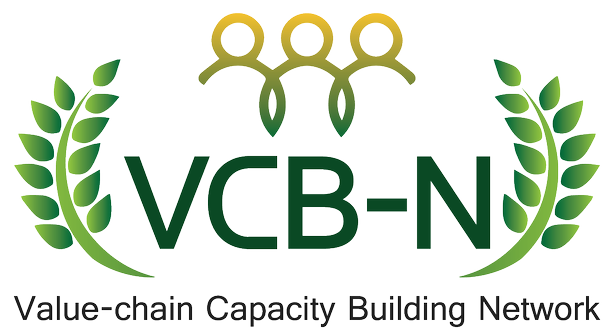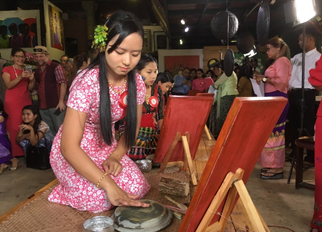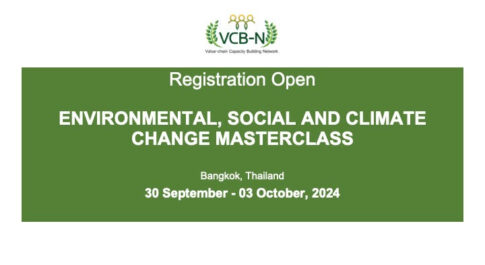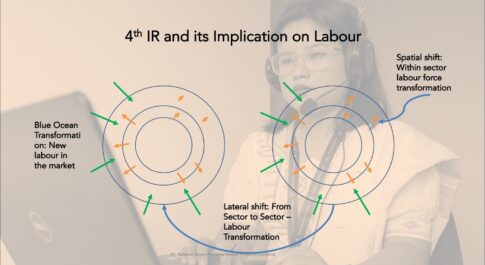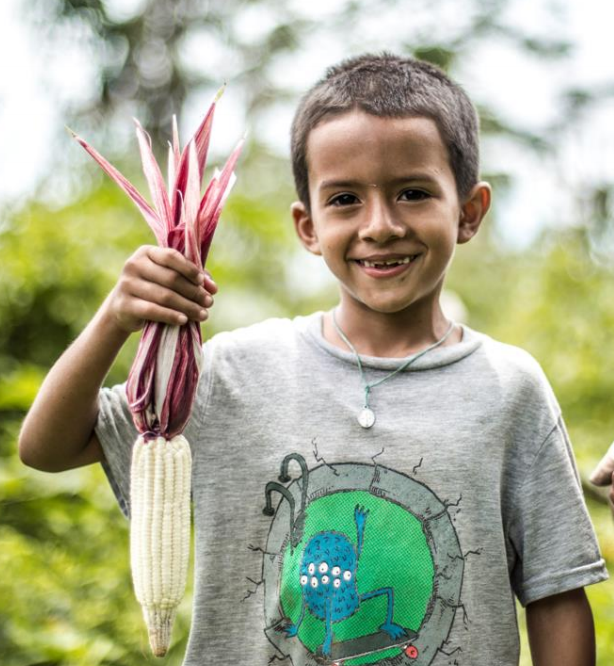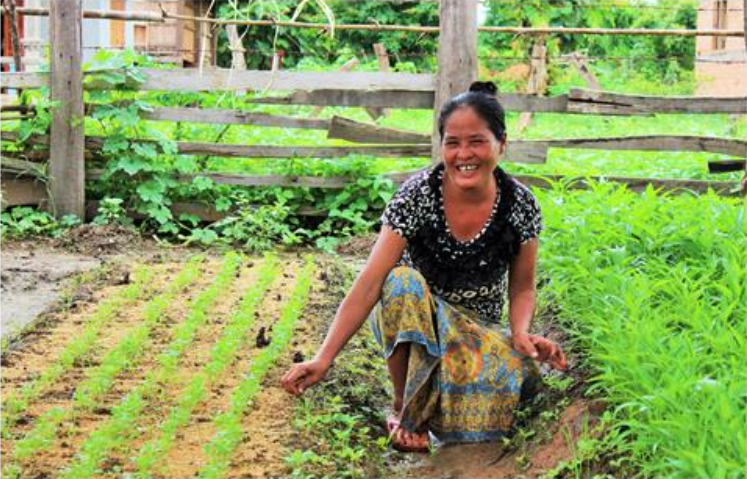
Good practice
Home garden – A new begining
The following good practice is conducted by Mr. Ritik Joshi. The case study was selected and presented in Mekong Knowledge and Learning Fair (IFAD) by representative from Lao PDR.
(For presentation in the event, please click here)
Background
The Southern Laos Food and Nutrition Security and Market Linkages Programme (FNML) is executed by the Ministry of Agriculture and Forestry, Government of Lao PDR, with funding from the International Fund for Agricultural Development (IFAD) and the Government of Lao PDR. FNML targets 12,000 households with a total of 70,500 beneficiaries who will be benefitted by the programme’s intervention in 5 targeted districts of 3 provinces, namely Phouvong & Sanxay districts in Attapeu province, Dakcheung district in Sekong Province and Ta’Oy & Samouay districts in Salavanh province. Total cost of Programme is 18.86 million USD. There are 4 main components of FNML: 1). Food and Nutrition Security and Pro-Poor Market Access, 2). Inclusive Rural Finance Support, 3). Institutional Support, and 4). Smallholder adaptation to climate change component (SACCC).
Innovations / Good Practices
This case illustrates new farming techniques, networks for marketing crops, production arrangements that increase the farmer’s share of food system profits, community support of small and mid-size operations that benefit both beginning and advanced farmers, on-farm diversification, and successful use of the imparted knowledge. On the implementation: Mrs. Khou started recycling water from her fish pond to her home garden, used cassava trees as farm fence, started production of natural compost, executed production of raised seed beds for different seasons, scaled up the home garden to cash crop plantation, integrating technology such as drip irrigation and green house in her garden.
The District Agriculture and Forestry Office (DAFO) and Kumban staffs provided technical agricultural training on various topics, including soil improvement techniques, seed bed preparation, nursery production, compost and herbal pesticide production and other necessary topics. Concerned technical assistants from FNML also supported Mrs. Khou regularly, with on the job technical training and facilitated her joining “Farmer to Farmer” extensions in and around her district and province to gain knowledge on new techniques and technology used in.
Impact
FNML has spread the home gardening activity to more than 10,000 households or to more than 50,000 direct beneficiaries along with a lot of other interventions to complement the home gardening activity.
In Mrs. Khou’s case, the Programme changed her home gardening (HG) practice by primarily diversifying her garden using over 20 varieties of vegetable seeds. Other farmers in her HG group did the same practice. Mrs. Khou is a diligent and patient farmer who invested her energy and commitment to her garden as a result of which now she eats health food and earns more income. The income generated from her HG activity motivated her to expand her HG area and thus she asked FNML to support her family with small irrigation scheme. After elaborated review FNML provided her with small water scheme with an initial investment of 8 million Kips. Results of her hard work and programme support fruited well and now she holds a new HG and chili plantation with an area of 5,000 square meters. She grows more than 20 different variety of vegetable and fruits. By using the FNML supported underground irrigation scheme she can produce diversified and climate resilient crops throughout the year and generates about 1 million kip per month by selling the surplus to the locals, restaurant’s and in the Agricultural Production Shop (APS) supported by FNML in the district market. She now earns an income of approximately 12 million kips ($1500) a year. Which means, in a year she was able to recover FNML’s investment for her irrigation scheme and reinvested the funds in her garden.
Facilitating Factors / Challenges
Initially, Mrs. Khou had to face a number of challenges, in the form of shortage of man power to nurture her garden, water constraints in dry season, limited access to agricultural inputs such as seeds, planting material and tools, damage due to insect pests, lack of knowledge, information and advisory services, poor soil fertility, access to market, confinement to her village with no exposure to new agricultural technology and most importantly the motivation to expand her efforts due to her financial situation. With FNML’s HG planning initiative, she received a series of technical trainings conducted by DAFO and Kum ban staff on introduction to line sowing, staggered sowing, staking and trellising, crop rotation, intercropping / mixed cropping, pest management along with agricultural inputs to support her to overcome the roadblocks and to gradually advance towards sustainable agriculture and improved livelihood.
Lessons Learned
Aside from the social benefits of home gardens, there were also direct contributions to household food security by increasing availability, accessibility, and utilization of food products. Other lessons in terms of benefits can be derived. They are:
• Environmental benefits – Mrs. Khou’s home gardens also provide a number of ecosystem services such as habitat for other beneficial organisms, nutrient recycling and reduced soil erosion. The rich diversity and composition of species and the dense distribution of vegetables noted extraordinary features of home garden ecology.
• Economic benefits– Home gardens are widely promoted by FNML as a mechanism to avert poverty and as a source of income for subsistence families in southern Laos.
• Uplifting the status of women – Home garden stimulated social change and development, i.e.. improving Mrs. Khou’s income and social status as well as her awareness of evolving food habits in her village, and for many women like Mrs. Khou sales of garden products are often the only
sources of income or livelihood.
• Knowledge management – Mrs. Khou is a proactive farmer and believes in the slogan “knowledge is power” and portrays all intensions of sharing it with others. She is identified to be FNML’s “Lead Farmer” and actively conduct Farmer to Farmer extension sessions to spread the good practices in and around her community. She has already trained more than 200 farmers on various topics including production of natural pesticide, herbicides, compost, water conservation techniques etc. She is considered as a Local Champion in HG as she practices sustainable and climate resilient agriculture and has diversified her garden by integrating fruit trees along with vegetables and also by having commercial chili plantation.
Recommendations
Based on this case experience, we would like to recommend to IFAD, various stakeholders and line agencies to continue promoting home gardening activity and moreover help the smallholders in diversifying their agricultural practices by complementing home gardening with cash crop production, small or medium livestock raising, integrating fish/frog ponds, use of technology etc. We also strongly recommend the inclusion of “Farmer to farmer extensions” as knowledge sharing platform.
You may want to read
